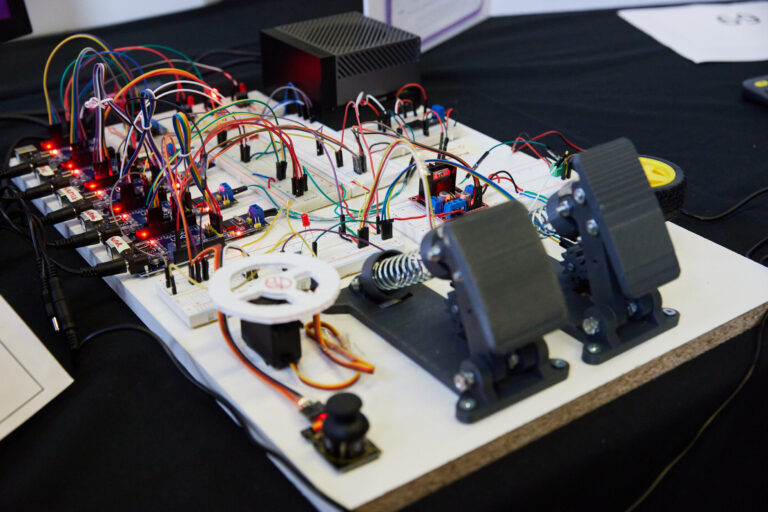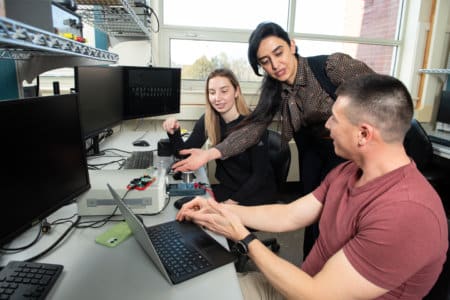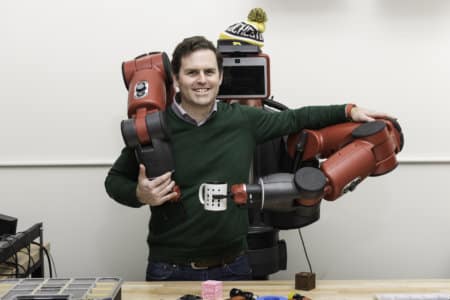
Systems and computer engineering experts are in demand today. Those with advanced knowledge and skills in fusing electrical engineering and computer science are widely needed in a world increasingly impacted by the perils and opportunities of rapidly advancing technology. From governments to the world’s most profitable companies, systems and computer engineers are required to integrate hardware and software in a unified system safely and efficiently.
If you aim to boost your career by pioneering robotics, networks, and other computer-based systems, start by getting a master’s degree from one of the top-ranked universities below:

Master’s and PhD students at Carleton University’s Department of Systems and Computer Engineering often work on projects with their supervisors and faculty members. Source: Carleton University
Carleton University
The Department of Systems and Computer Engineering at Carleton University is a recognised world-class institution in merging hardware, software, information, and analytics. Located in a beautiful campus in Ottawa, the capital city of Canada and one of the country’s business and tech hubs dubbed “Silicon Valley North,” the department offers the MASc in Electrical and Computer Engineering, MEng in Electrical and Computer Engineering, PhD in Electrical and Computer Engineering.
The department stands out for its strong and diverse research activity and collaboration with industry, government labs, and hospitals. As a graduate student here, you’ll be surrounded by and work in modern, well-equipped laboratories with state-of-the-art equipment and excellent computer facilities. There are over 1,000 engineering workstations and laboratories that are unique in Canada while others are among a few in the world.
Perhaps what’s most impactful is the opportunity to work with some of the best minds in the field. MASc and PhD students typically engage in research with their supervisor, fellowships such as the Ericsson-Carleton 5G Fellowships and other projects such as “Machine Learning applied to Network Management”. MEng students can take part in a course-based project with a faculty member to conduct an engineering study, analysis, and/or design project.
Inside and outside the classroom, students benefit from Carleton University’s strong sense of community and appreciation for the arts, the outdoors, professional sports, and vibrant nightlife. The city is affordable and the campus is beside the historic Rideau Canal, an official UNESCO World Heritage Site. Start your journey towards becoming an expert in 5G, 6G and beyond, modelling and simulation, robotics and control and software engineering — apply to the Department of Systems and Computer Engineering today.

At Kansas State University, computer science students have opportunities to participate in outside-of-class activities, including research experience, internships and community outreach. Source: Kansas State University
Kansas State University
Kansas State University’s (K-State) Carl R. Ice College of Engineering is where more than 3,100 students are striving to become the next generation of diverse and inclusive technological leaders. Over 27,000 graduates before them are now working alongside the disciplines of health and basic sciences, business, finance and public policy to take on and solve the challenges we’re facing.
“Higher, bigger, farther, faster, global and more inclusive — all while standing at the forefront of technology and innovation — this is the direction of the Carl R. Ice College of Engineering at Kansas State University,” says dean Matt O’Keefe.
Graduate programmes prepare students for their future careers well. They have a 100% career placement and record a US$97,695 average starting salary. Although the college is part of a Carnegie R1 doctoral university, doctorate and master’s degrees here include leadership and professional development opportunities for students as well. Graduate students also have the opportunity to travel to present their work at national and international conferences and workshops.
The master’s degree programme in Electrical and Computer Engineering takes a broad approach to the discipline. The goal is to prepare students for advanced positions in the power, renewable energy, communications and computing industry as well as for further academic studies. Past students not only have published in journals and conferences but also land jobs in academia and industry, both in the US and abroad.

Industries of all kinds – from business and health care to music and chemistry – are in need of skilled computer scientists who can solve complex problems. Oregon State University aims to address that need. Source: Oregon State University
Oregon State University
At Oregon State University, students at the College of Engineering earn a degree built for the future. The college prides itself on offering a resource-rich environment, known as one of the only three universities in the country with land, sun, sea, and space grant designations. Here, students’ days are filled with hands-on, real-world experience led by an excellent faculty, making real contributions to groundbreaking research.
Research is the core of Oregon State. “If we can imagine it, we can create it” is the College of Engineering’s enthusiastic promise towards producing award-winning outcomes and partnerships.
Here, you can earn an MS, MEng and a PhD in Electrical and Computer Engineering. What makes these degrees stand out is its Outstanding Scholars Programme. These are four-year financial packages for highly qualified PhD applicants in all speciality areas. As a recipient, you’ll be able to focus on research starting in your first year, part of the college’s commitment to fund all full-time PhD students through internal or external sources.
It was this programme that brought Bangladeshi Sanjida Yeasmin to Oregon State. After completing her master’s degree at the Hong Kong University of Science and Technology, she chose to pursue a PhD here as her research interests align with those of Larry Cheng, associate professor of electrical and computer engineering, who is now her project advisor. Today, her research focuses on biosensors, analytical devices that noninvasively detect biomolecules and other chemicals in the body to measure aspects of health.
“We are doing something that can solve existing problems and have the potential to go to market immediately. That’s the thing that always drives me,” Yeasmin says. “Starting from material synthesis, device fabrication and sensing — everything is conducted in the Cheng research lab. We’re developing sensors that can rapidly and precisely assess health conditions, thereby reducing health risks and avoiding hospital visits. This is the beginning of a new adventure for me, and I’m looking forward to it.”
*Some of the institutions featured in this article are commercial partners of Study International










